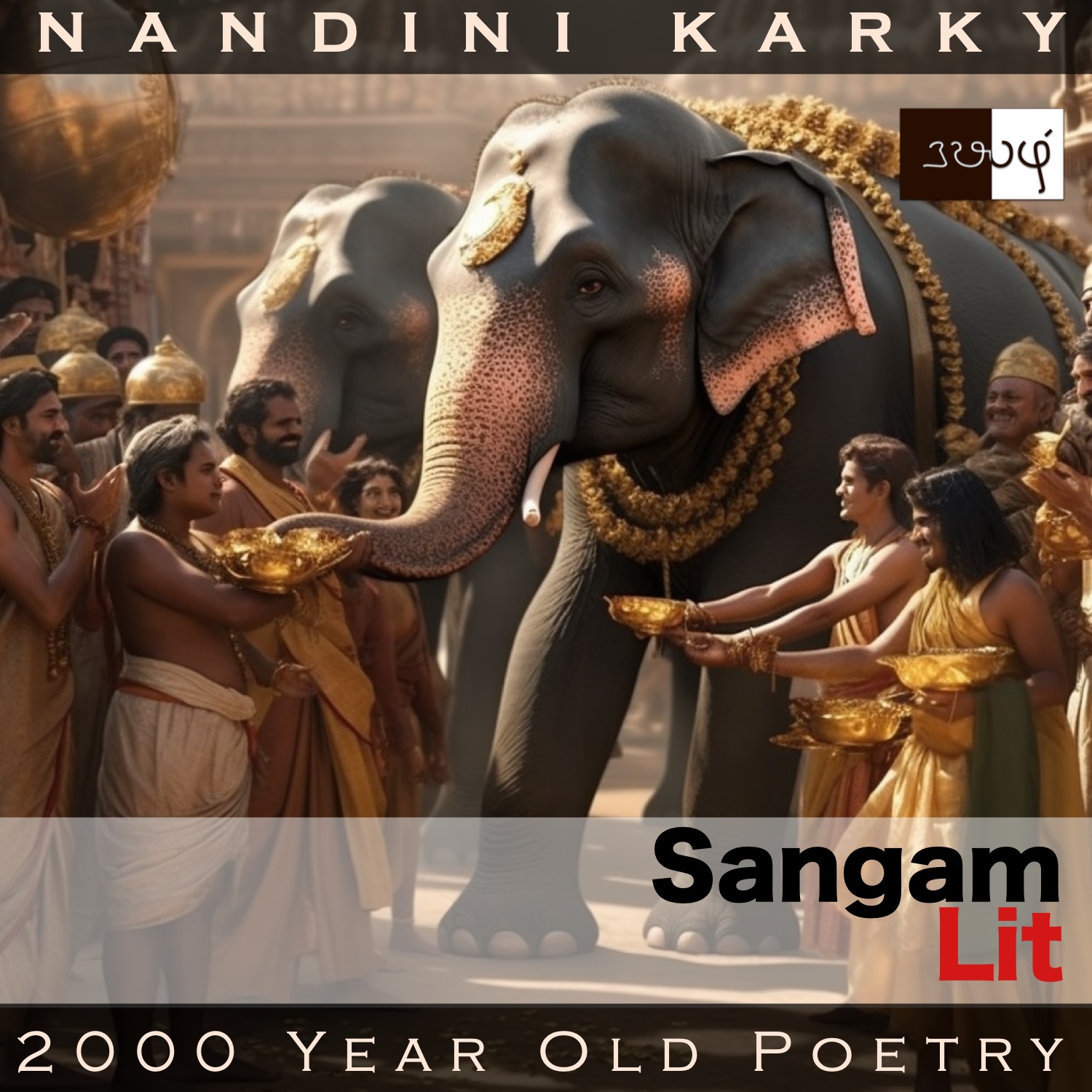Podcast: Play in new window | Download
Subscribe: Apple Podcasts | Spotify | Amazon Music | Android | iHeartRadio | Email | TuneIn | RSS | More
In this episode, we learn of unintended consequences of charity, as depicted in Sangam Literary work, Puranaanooru 153, penned about the Velir King Valvil Ori by the poet Vanparanar. Set in the category of ‘Paadaan Thinai’ or ‘King’s praise’, the verse speaks about the state of artists, who have witnessed this king’s generosity.

மழை அணி குன்றத்துக் கிழவன், நாளும்,
இழை அணி யானை இரப்போர்க்கு ஈயும்,
சுடர் விடு பசும் பூண், சூர்ப்பு அமை முன் கை,
அடு போர் ஆனா, ஆதன் ஓரி
மாரி வண் கொடை காணிய, நன்றும்
சென்றதுமன், எம் கண்ணுளங் கடும்பே;
பனி நீர்ப் பூவா மணி மிடை குவளை
வால் நார்த் தொடுத்த கண்ணியும், கலனும்,
யானை இனத்தொடு பெற்றனர், நீங்கி,
பசியாராகல் மாறுகொல் விசி பிணிக்
கூடு கொள் இன் இயம் கறங்க,
ஆடலும் ஒல்லார், தம் பாடலும் மறந்தே?
A change of pace from the long song we previously encountered. The poet’s words can be translated as follows:
“Hearing about the lord of the cloud-covered mountains and his everyday charity of granting gold-decked elephants to those who came seeking to him, my troupe of performers went to witness for themselves, the rain-like rich generosity of the esteemed Ori – the one who loves battles, and the one who wears radiant ornaments and a curving armlet on his strong forearms. They returned with a garland stringed together with blue lotuses that bloom not in cool waters, jewels many, and herds of elephants too. Could it be because they seem to have no hunger any more that they have forgotten how to sing and dance to the pleasant sounds of their well-stringed musical instruments?”
Let’s delve into the words here. The poet starts by mentioning how the fame of King Ori had reached the ears of his performing troupe of bards, singers and dancers. They had heard about how he gives away elephants to people who come seeking his patronage, and so, wanting to see that for themselves they headed to meet the man! In line with the review about him, the king seemed to have given them lotuses that don’t bloom in the water, implying that these have bloomed in the goldsmith’s forge. Not only that, numerous jewels and entire herds of elephants were donated by this king, the poet says. He concludes by speculating the reason for these performers not singing, dancing or playing their musical instruments any more and declares it must be because they have forgotten what hunger is!
Yet again, the poet establishes that art prospers only where there’s want! Too much comfort and complacency go not hand in hand with artistic creations seems to be the philosophy then. Turning in another direction, I want to bring your attention to the way the king is addressed in this verse. He’s called ‘Aathan Ori’. This is of special interest because in the Keezhadi excavations, numerous pot shards were found with the inscription ‘Aathan’ in ancient Tamil script. Recently, I learnt from the words of an archaeologist on a podcast that ‘Aathan’ is not a name from the Sangam era but an honorific like the Japanese ‘San’. This Sangam verse shakes hands with that archaeologist’s inference in using that word to address this Velir King with respect and admiration. Fascinating to find these nuanced links between fields in the shards of these words from the past!




Share your thoughts...